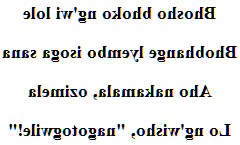Sukuma love poem
Bhosho bhoko ng'wi lole
Bhobhange lyembo isoga sana
Aho nakamala, ozimela
Lo ng'wisho, "nagotogwile!"


→ French poem ←
Sukuma language
Translation of the love poem into Nyantuzu-a sukuma (Kigwe, Kisukuma, Kiya, Kesukuma, Gwe).
This Bantu language, from the Nigero-Congolese family, is spoken in Tanzania, especially in the regions of Mwanza, Maswa, Kwimba and Shinyanga, by 5.5 million speakers.
Sukuma has several dialects, which can be classified into four major groups: Kemunasukuma in the north, Kemunakiya in the east, Kemunadakama in the south, and Kemunang’weli in the west. Within these groups certain dialects such as Kɪmunasukuma, Gɪmunantuzu and Jimunakɪɪyâ, are mutually intelligible.
As everywhere in Africa, the language is oral, and the oral tradition, whether recited, told, declaimed or sung, serves to transmit culture, values, history to younger generations, because the role of the oldest is to teach to protect young people.
Among the Sukumas, these stories mix reality and fiction, some fictions are parables, to describe a reality, with recurring themes such those concerning: history, death, fate, spirits, ogres, and the way to behave.
Here is an example from their oral tradition: “There was an ogre who terrified people. One day this ogre ate all the villagers except a woman who was pregnant. She was telling her son the story of this ogre, and when this one became adult, he wanted to find this ogre. He ended up finding him, killing him, and when he opened his belly, all people that the ogre had swallowed, escaped."
Tanzania and the Sukumas
Tanzania ex Tanganyika associated with Zanzibar has 51 million inhabitants of different ethnicities.
Durind the first millennium AD, the Sukumas were part of the last great migrations of the Bantu peoples. Between them they are called Basukuma. Their ancestors were Balongos living in the current Geita district west of Lake Victoria.
One of their stories tells that they were from Lushamba (Geita), and their exhausted leader (ntemi) said: Nye-Nsukumale aha = Let me camp here. The place was called Sukumale aha and later called Sukuma.
Basukuma society is patrilineal, and lhane, is the rite of coming of age. Their diet is matriarchal and like many other African peoples, they live from hunting, breeding and agriculture (sweet potatoes, millet, corn, rice and vegetables).
Today, the Basukumas represent 20% of the Tanzanian population, and are the largest ethnic group in this country. They are mostly found in the south and east of Lake Victoria.
With the Massais, they were often in opposition to try to steal the cattle. You will recognize them by their large white bracelets, their songs, their dances and music.